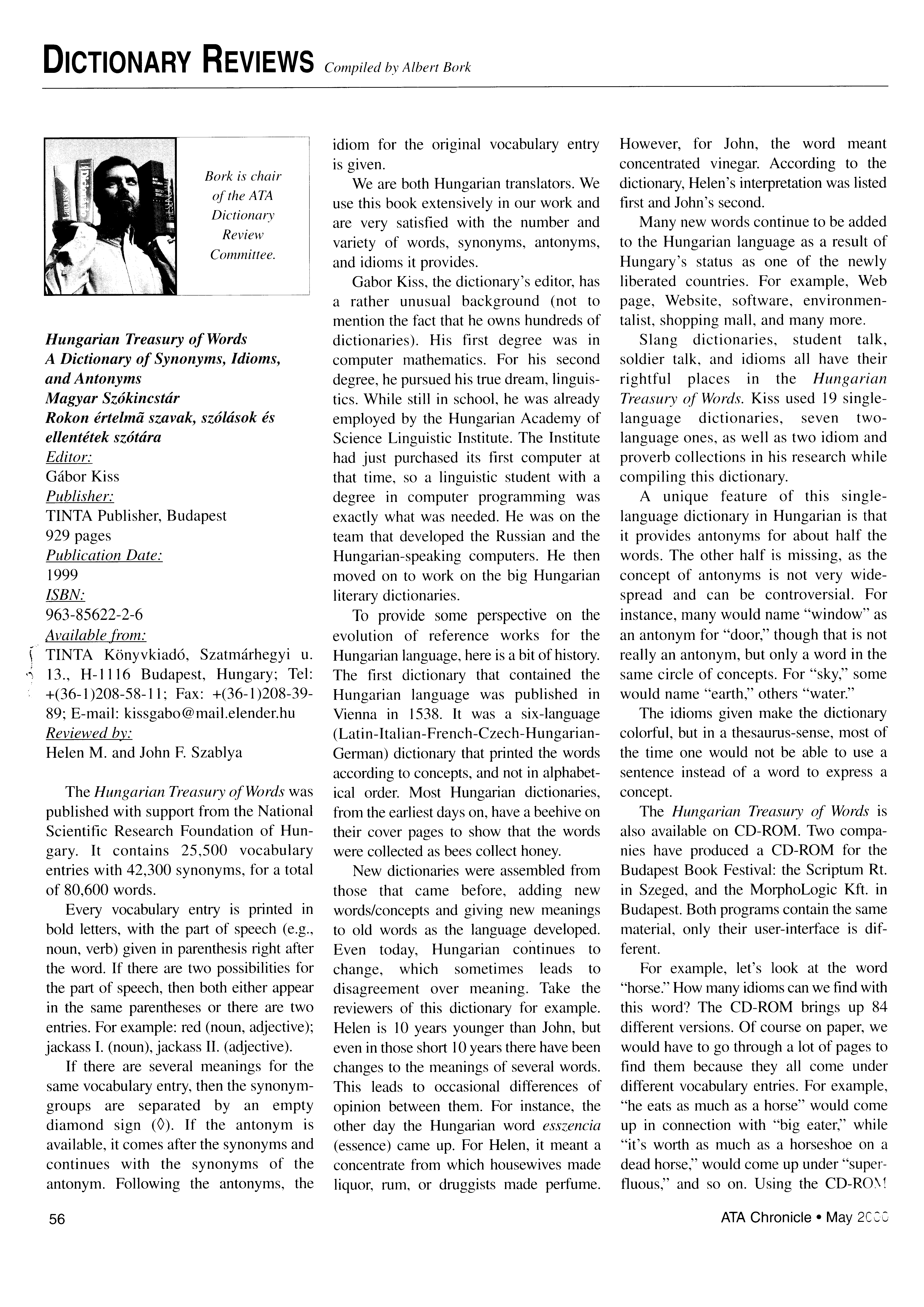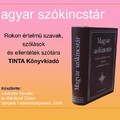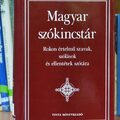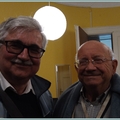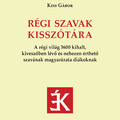A Magyar szókincstár amerikai fogadtatása
Alább közöljük az Amerikai Fordítók Társaságának (American Translators Association) folyóiratában 2000 májusában megjelent recenziót a TINTA Könyvkiadó azóta is legnagyobb sikerkönyvéről, a Magyar szókincstárról.
The ATA Chronicle
A Publication of the American Translators Association
Volume XXIX · NUMBER 5
MAY 2000
page 56–57
Hungarian Treasury of Words
A Dictionary of Synonyms, Idioms, and Antonyms
Magyar Szókincstár
Rokon értelmű szavak, szólások és ellentétek szótára
Editor: Gábor Kiss
Publisher: TINTA Publisher, Budapest 929 pages
Publication Date: 1999
ISBN: 963-85622-2-6
Available from:
TINTA Könyvkiadó, Szatmárhegy u. 13., H-1116 Budapest, Hungary
Tel:+(36-1)371-0501
E-mail: info@tintakiado.hu
Reviewed by: Helen M. and John F. Szablya
The Hungarian Treasury of Words was published with support from the National Scientific Research Foundation of Hungary. It contains 25,500 vocabulary entries with 42,300 synonyms, for a total of 80,600 words.
Every vocabulary entry is printed in bold letters, with the part of speech (e.g., noun, verb) given in parenthesis right after the word. If there are two possibilities for the part of speech, then both either appear in the same parentheses or there are two entries. For example: red (noun, adjective); jackass I. (noun), jackass II. (adjective).
If there are several meanings for the same vocabulary entry, then the synonym-groups are separated by an empty diamond sign (à). If the antonym is available, it comes after the synonyms and continues with the synonyms of the antonym. Following the antonyms, the idiom for the original vocabulary entry is given.
We are both Hungarian translators. We use this book extensively in our work and are very satisfied with the number and variety of words, synonyms, antonyms, and idioms it provides.
Gabor Kiss, the dictionary’s editor, has a rather unusual background (not to mention the fact that he owns hundreds of dictionaries). His first degree was in computer mathematics. For his second degree, he pursued his true dream, linguistics. While still in school, he was already employed by the Hungarian Academy of Science Linguistic Institute. The Institute had just purchased its first computer at that time, so a linguistic student with a degree in computer programming was exactly what was needed. He was on the team that developed the Russian and the Hungarian-speaking computers. He then moved on to work on the big Hungarian literary dictionaries.
To provide some perspective on the evolution of reference works for the Hungarian language, here is a bit of history. The first dictionary that contained the Hungarian language was published in Vienna in 1538. It was a six-language (Latin-Italian-French-Czech-Hungarian-German) dictionary that printed the words according to concepts, and not in alphabetical order. Most Hungarian dictionaries, from the earliest days on, have a beehive on their cover pages to show that the words were collected as bees collect honey.
New dictionaries were assembled from those that came before, adding new words/concepts and giving new meanings to old words as the language developed. Even today, Hungarian continues to change, which sometimes leads to disagreement over meaning. Take the reviewers of this dictionary for example. Helen is 10 years younger than John, but even in those short 10 years there have been changes to the meanings of several words. This leads to occasional differences of opinion between them. For instance, the other day the Hungarian word esszencia (essence) came up. For Helen, it meant a concentrate from which housewives made liquor, rum, or druggists made perfume.
However, for John, the word meant concentrated vinegar. According to the dictionary, Helen’s interpretation was listed first and John’s second.
Many new words continue to be added to the Hungarian language as a result of Hungary’s status as one of the newly liberated countries. For example, Web page, Website, software, environmentalist, shopping mall, and many more.
Slang dictionaries, student talk, soldier talk, and idioms all have their rightful places in the Hungarian Treasury of Words. Kiss used 19 single-language dictionaries, seven two-language ones, as well as two idiom and proverb collections in his research while compiling this dictionary.
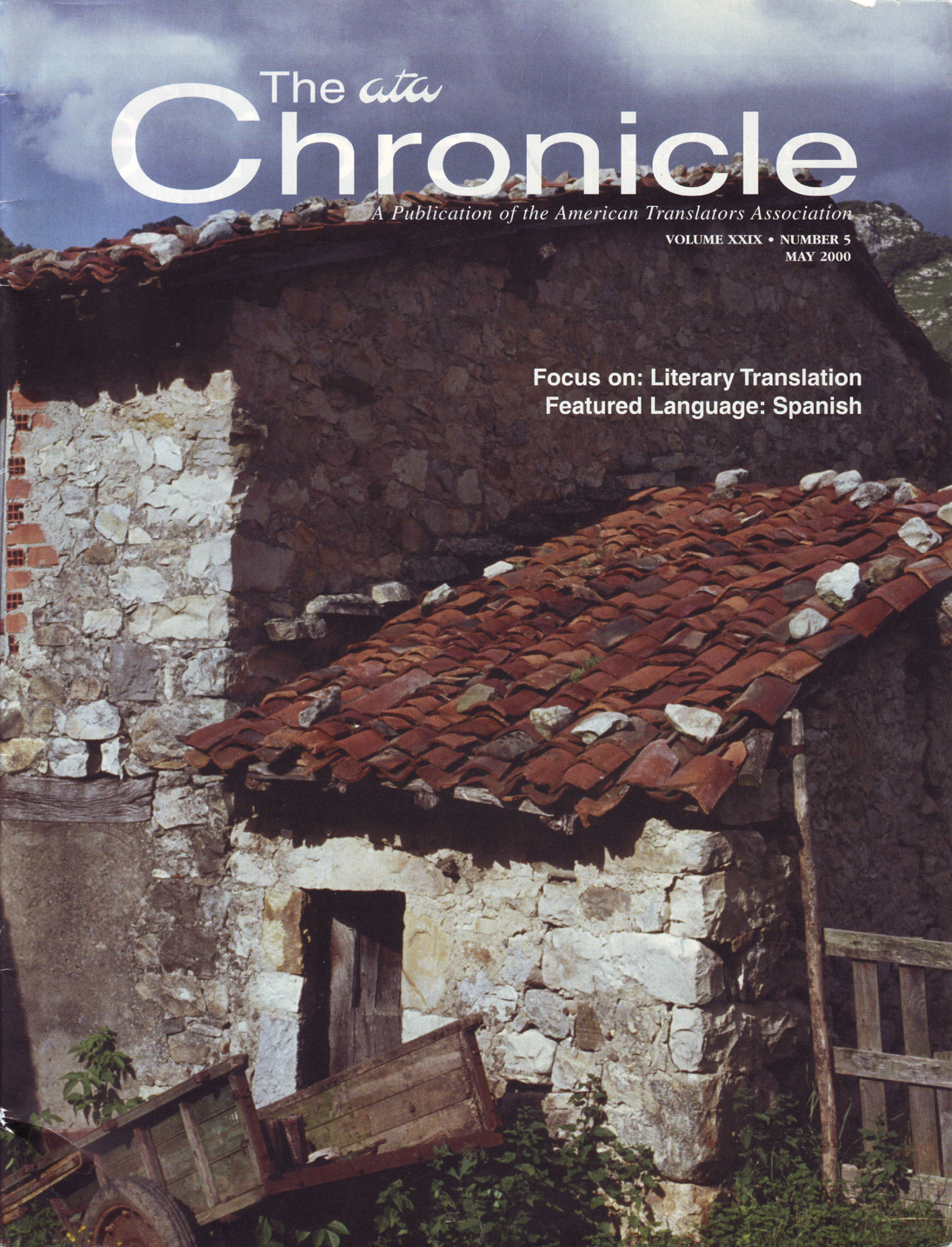
A unique feature of this single-language dictionary in Hungarian is that it provides antonyms for about half the words. The other half is missing, as the concept of antonyms is not very widespread and can be controversial. For instance, many would name “window” as an antonym for “door,” though that is not really an antonym, but only a word in the same circle of concepts. For “sky,” some would name “earth,” others “water.”
The idioms given make the dictionary colorful, but in a thesaurus-sense, most of the time one would not be able to use a sentence instead of a word to express a concept.
The Hungarian Treasury of Words is also available on CD-ROM. Two companies have produced a CD-ROM for the Budapest Book Festival: the Scriptum Rt. in Szeged, and the MorphoLogic Kft. in Budapest. Both programs contain the same material, only their user-interface is different.
For example, let’s look at the word “horse.” How many idioms can we find with this word? The CD-ROM brings up 84 different versions. Of course on paper, we would have to go through a lot of pages to find them because they all come under different vocabulary entries. For example, “he eats as much as a horse” would come up in connection with “big eater,” while “it’s worth as much as a horseshoe on a dead horse,” would come up under “superfluous,” and so on. Using the CD-ROM version, we can bring up all 84 varieties at the click of the mouse.
The most important use of this dictionary is to monitor the precise, colorful, and correct use of the Hungarian language. This is going to be increasingly important, especially since Hungary is going to become a member of the European Union. Language is the carrier of culture and it is important to keep the identity of the language alive.
Both of us wholeheartedly recommend this dictionary. It is available in Hungary and at all Hungarian bookstores in the U.S. and Canada, and can be ordered using the information above from any bookstore or individual.
